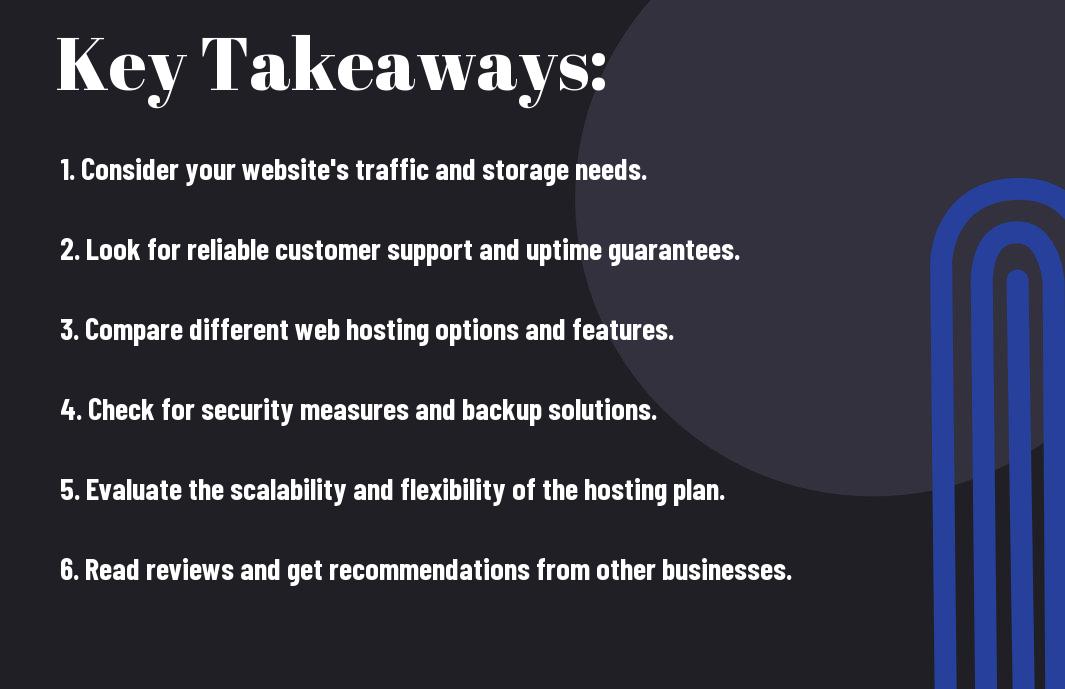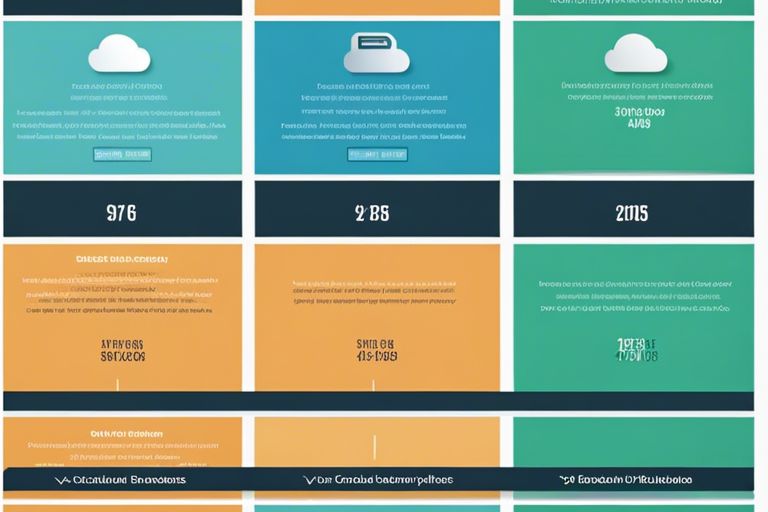Ensuring that you have the best web hosting plan for your business is crucial for the success of your online presence. With so many options available, it can be overwhelming to select the right plan that meets the unique needs of your business. In this comprehensive guide, I will walk you through the most important factors to consider when choosing a web hosting plan, including reliability, security, scalability, and customer support. By the end of this post, you will have the knowledge and confidence to make an informed decision that will positively impact your business.
Key Takeaways:
- Assess your business needs: Before choosing a web hosting plan, consider the specific requirements of your business, such as website size, traffic volume, and e-commerce capabilities.
- Compare features and prices: Research different hosting providers to find the best combination of features, reliability, and affordability. Look for options like unlimited bandwidth, security features, and customer support.
- Consider scalability: Choose a hosting plan that can grow with your business. Look for providers that offer easy upgrades and scalability options to accommodate future expansion.

Types of Web Hosting Plans
Assuming you are in the process of looking for the best web hosting plan for your business, it’s important to understand the different types of web hosting plans available to you. Each type offers its own set of features and benefits, so it’s essential to choose the one that best suits your specific needs.
| Shared Hosting | Virtual Private Servers (VPS) |
|---|---|
| Most affordable option | Offers more control and flexibility |
| Resources are shared with other websites | Provides dedicated resources within a shared environment |
| Ideal for small to medium-sized businesses | Can handle higher traffic and resource-intensive applications |
| Limited customization and scalability | More expensive than shared hosting |
| May experience performance issues due to sharing resources | Offers better performance and stability |
Shared Hosting
If you are just starting out and have budget constraints, shared hosting can be the most suitable option for your business. You will be sharing server resources with other websites, which makes it the most affordable option. However, keep in mind that the performance may be affected by the activities of other sites sharing the server.
Virtual Private Servers (VPS)
Virtual Private Servers (VPS) offer more control and flexibility compared to shared hosting. With VPS, you have dedicated resources within a shared environment, allowing for better performance and stability. It is an ideal choice for businesses that require more control over their hosting environment and can handle higher traffic and resource-intensive applications.
Dedicated Hosting
For businesses that need maximum performance, security, and control, dedicated hosting is the best option. With a dedicated server, you have full control over the server resources and can customize it to meet your specific requirements. This type of hosting is more expensive than shared hosting or VPS, but it provides unparalleled performance and security.
Cloud Hosting
Cloud hosting is a scalable and flexible hosting solution that offers resources on-demand. It is ideal for businesses with fluctuating website traffic or those that need to scale their resources quickly. The cloud infrastructure provides high reliability and performance, making it a popular choice for businesses of all sizes.
Managed Web Hosting
If you prefer to have your hosting provider take care of the technical aspects of managing your server, managed web hosting is the way to go. This type of hosting is suitable for businesses that lack the expertise or resources to manage their servers and want to focus on their core business operations. Your hosting provider will take care of server maintenance, security updates, and technical support, allowing you to concentrate on growing your business.
 “`html
“`html
Key Features to Consider
Unlike generic web hosting plans, choosing the best web hosting plan for your business requires careful consideration of specific features that will impact your website’s performance and security. Here are some key features to prioritize when selecting a web hosting plan:
- Uptime Guarantee: Ensure that the hosting provider offers a high uptime guarantee to minimize website downtime and ensure reliable accessibility to your site. You can find the best web hosting services for small businesses in 2023 with a strong uptime guarantee here.
- Bandwidth and Storage: Evaluate the amount of bandwidth and storage offered by the hosting plan to accommodate your website’s traffic and data storage needs.
- Security Measures: Look for features such as SSL certificates, firewalls, and regular security updates to protect your website and customer data from malicious threats.
- Scalability Options: Consider the potential for your business to grow and choose a hosting plan that can easily scale to accommodate increased traffic and resource demands.
The right combination of these features is essential for ensuring the optimal performance and security of your business website.
Uptime Guarantee
When choosing a web hosting plan, uptime guarantee is crucial. It ensures that your website is accessible to visitors at all times, which is vital for your business’s online presence and customer experience. An uptime guarantee of 99.9% or higher is considered industry standard, so make sure to prioritize this feature when selecting a web hosting plan.
Bandwidth and Storage
Having sufficient bandwidth and storage is essential for effectively managing website traffic and storing data. You must ensure that your hosting plan provides enough resources to accommodate your website’s current needs and potential growth in the future. A plan with unlimited bandwidth and scalable storage options can offer the flexibility you need.
Security Measures
Protecting your website and customer data from cyber threats should be a top priority. Look for web hosting plans that offer robust security measures such as SSL certificates, firewalls, and regular security updates. These features can safeguard your website from malicious attacks and instill trust in your customers.
Scalability Options
As your business grows, your website’s traffic and resource demands will increase. It’s important to choose a web hosting plan with scalability options that can accommodate your evolving needs. This ensures that your website can handle higher volumes of traffic and maintain optimal performance as your business expands.
“`
Evaluating Web Hosting Providers
For your business, finding the best web hosting plan is crucial, and evaluating web hosting providers is a critical step in the process. When evaluating potential providers, there are several key factors to consider to ensure you make the right decision for your business’s needs.
Reputation and Customer Reviews
When evaluating web hosting providers, one of the first things you should consider is their reputation and customer reviews. Look for providers with a strong reputation in the industry and read customer reviews to get a sense of the level of satisfaction among their clients. Pay attention to any recurring issues or complaints to ensure you choose a reliable provider.
Customer Support Services
Another important factor to consider is the quality of customer support services offered by the web hosting provider. Reliable customer support can make a significant difference in your experience as a client. Look for providers that offer 24/7 support, multiple communication channels, and a responsive and knowledgeable support team to assist you with any technical issues or concerns.
Pricing and Value for Money
When evaluating web hosting providers, pricing is, understandably, a key consideration. You want to find a plan that offers value for money while meeting your business’s needs. Compare the pricing and features of different plans to find one that offers the right balance of affordability and functionality for your business.
Additional Services and Bonuses
Finally, don’t forget to consider the additional services and bonuses offered by the web hosting provider. Some providers offer extra features such as website builders, security tools, or marketing credits, which can add significant value to your hosting plan. These additional services can contribute to the overall package and enhance the effectiveness of your web hosting plan for your business.
Making the Decision
Despite the overwhelming number of web hosting options available, it’s essential to make a well-informed decision when choosing the best web hosting plan for your business. It’s important to consider factors such as reliability, security, customer support, and scalability. To assist you in making this decision, you can refer to The Best Small Business Hosting Services for 2023 for a list of top-rated web hosting providers.
Comparing Top Contenders
When comparing top web hosting contenders, it’s crucial to evaluate their key features, such as uptime, speed, pricing, and customer reviews. Consider creating a table with the top contenders in one column and their features in another. This will allow you to easily compare and contrast the essential details and ensure you are making the most informed decision for your business.
Testing the Service
Once you have narrowed down your options, it’s time to test the service of your selected web hosting providers. Testing the service will give you a firsthand experience of their performance, user interface, and customer support. Pay attention to uptime and load times, as these are critical factors that can impact your business’s online presence. Additionally, evaluate their customer support by reaching out with any inquiries you may have. This will give you an indication of the level of support you can expect should you encounter any issues.
The Best Web Hosting Plan for Your Business
The key to finding the best web hosting plan for your business lies in understanding your specific needs and doing thorough research. By determining the size of your website, the amount of traffic you expect, and the features you require, you can narrow down the options and find a plan that suits your needs. Additionally, consider the reliability and customer support offered by the hosting provider, as well as any additional features that may benefit your business. Remember to also take into account your budget and scalability needs, as your hosting plan should be able to grow with your business. By carefully evaluating these factors, you can find the best web hosting plan that will support your business and help it thrive online.
FAQ
Q: What factors should I consider when choosing a web hosting plan for my business?
A: When choosing a web hosting plan for your business, consider factors such as the website’s traffic, storage and bandwidth requirements, uptime guarantee, customer support, security features, and scalability options. It’s important to find a plan that meets your current needs and allows for growth in the future.
Q: What are the different types of web hosting plans available for businesses?
A: There are several types of web hosting plans available for businesses, including shared hosting, VPS hosting, dedicated server hosting, and cloud hosting. Each type has its own advantages and limitations, so it’s important to choose the one that best suits your business’s requirements and budget.
Q: How can I determine the bandwidth and storage requirements for my business website?
A: To determine the bandwidth and storage requirements for your business website, consider factors such as the average number of monthly visitors, the size of your web pages, the amount of multimedia content you’ll be hosting, and the expected growth of your website. It’s important to ensure that your chosen hosting plan can accommodate your website’s needs without causing slowdowns or issues for your visitors.
Q: What should I look for in terms of security features when choosing a web hosting plan?
A: When choosing a web hosting plan for your business, look for security features such as SSL certificates, regular backups, DDoS protection, firewalls, and malware scanning. These features are essential for protecting your website and the data of your customers from cyber threats and attacks.
Q: How can I ensure that the web hosting plan I choose can support the growth of my business?
A: To ensure that the web hosting plan you choose can support the growth of your business, look for options that offer scalability, such as the ability to easily upgrade to a higher-tier plan or add additional resources as your website’s traffic and data needs increase. It’s also important to consider the provider’s reputation and track record for reliability and performance.
CATEGORY:Web Hosting

